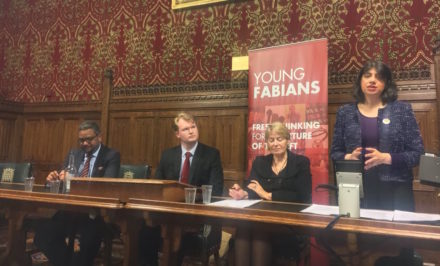
Last week saw the Commonwealth Heads of Government Meeting (CHOGM) come to London. It was a week of meetings, controversies and not a small amount of embarrassment for the government in the wake of the Windrush crisis. It also saw the first of three Young Fabians events concentrating on the Commonwealth.
The Commonwealth has taken on a renewed significance in the light of Britain’s impending departure from the EU. Questions are being asked about the role of the Commonwealth and its members in our trading future particularly, but also about the future of the Commonwealth as an organisation and Britain’s role in it. With these weighty issues at stake, we held an event looking at the historical role of the Labour Party and the Fabians in the development of the modern Commonwealth of Nations.
We had the pleasure of welcoming Seema Malhotra MP, member of the Brexit select committee, Dr Sue Onslow, deputy director of the Institute of Commonwealth Studies and Dr Asanga Welikala, lecturer in Commonwealth constitutional history at the University of Edinburgh.
Seema Malhotra highlighted the indelible mark that Commonwealth citizens have made on this country, and the role Labour had in welcoming them here. She also highlighted the responsibility we owe to those who heeded the call to help rebuild the ‘Mother Country’ – a responsibility we have failed to live up to of late.
Sue Onslow took us through an excellent pocket-history of how the Labour Party shaped the modern Commonwealth. From decolonisation, the induction of India after independence and the party’s efforts to make the Commonwealth an alternative to EEC membership right up to today. These provided salient lessons for any government in its approach to future relations with the Commonwealth post-Brexit.
The Commonwealth is not a panacea to Brexit; it is not a great trading-bloc. But that doesn’t mean the Commonwealth is not worth focussing on. It is a group of countries with a common history, language and laws bound together by common ties. The Commonwealth historically was a vehicle of de-colonisation and latterly development. It can still be an effective vehicle for development if we are willing to revitalise the institutions of the Commonwealth through proper and sustained investment.
This was highlighted by Dr Welikala, who emphasised the role of the Labour Party and Fabian intellectuals in the development of several Commonwealth nations, particularly Sri Lanka. Cooperation and the free exchange of ideas form the bedrock of the Commonwealth.
Britain is central to those networks that undergird the Commonwealth, and they in turn magnify British soft power. Through education, thousands of Commonwealth citizens pass through our universities, these networks are maintained and grown. Nevertheless, the hostile immigration environment, particularly for students, threatens to fatally cripple this key aspect of British soft power.
All the panel members agreed that the Labour Party needs to think hard and cogently about the Commonwealth. Whilst it cannot replace the EU, it is an important part of our past and our future. We owe a duty to the Commonwealth citizens living in this country, we owe a duty to those nations that still rely on this country and we must strengthen the organs of the Commonwealth.
Bren Albiston is a Young Fabian member.




More from LabourList
‘Council Tax shouldn’t punish those who have the least or those we owe the most’
Two-thirds of Labour members say government has made too many policy U-turns, poll reveals
‘Two states, one future: five steps on the path to peace for Israelis and Palestinians’